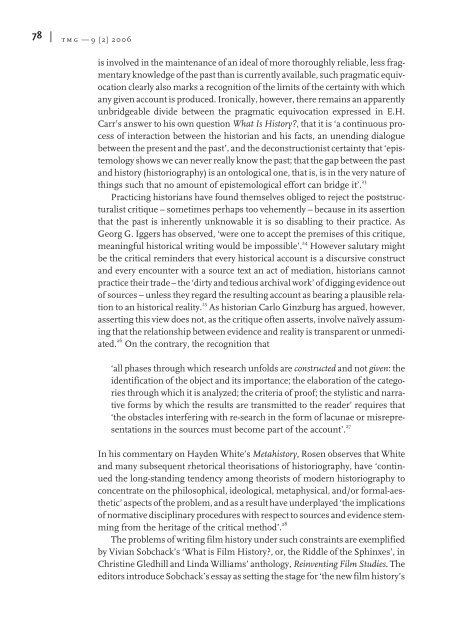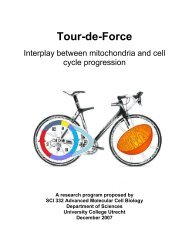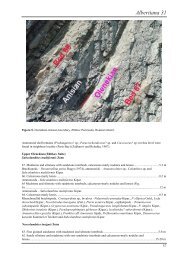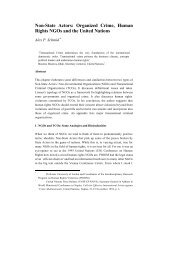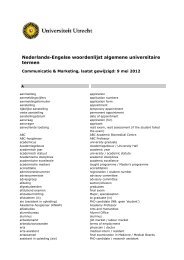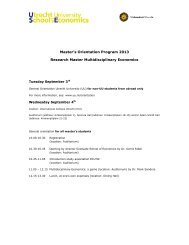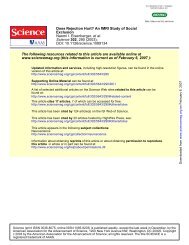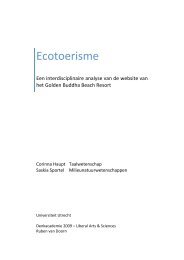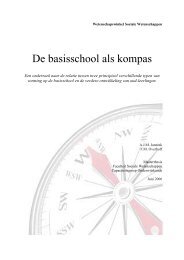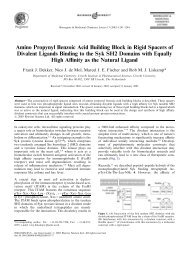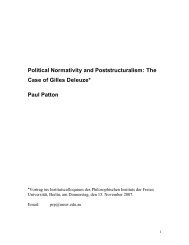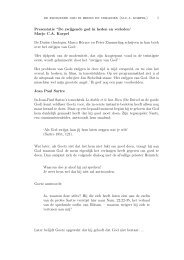Artikel: On the prospect of writing cinema history from below
Artikel: On the prospect of writing cinema history from below
Artikel: On the prospect of writing cinema history from below
Create successful ePaper yourself
Turn your PDF publications into a flip-book with our unique Google optimized e-Paper software.
78 | tmg — 9 [2] 2006is involved in <strong>the</strong> maintenance <strong>of</strong> an ideal <strong>of</strong> more thoroughly reliable, less fragmentaryknowledge <strong>of</strong> <strong>the</strong> past than is currently available, such pragmatic equivocationclearly also marks a recognition <strong>of</strong> <strong>the</strong> limits <strong>of</strong> <strong>the</strong> certainty with whichany given account is produced. Ironically, however, <strong>the</strong>re remains an apparentlyunbridgeable divide between <strong>the</strong> pragmatic equivocation expressed in E.H.Carr’s answer to his own question What Is History?, that it is ‘a continuous process<strong>of</strong> interaction between <strong>the</strong> historian and his facts, an unending dialoguebetween <strong>the</strong> present and <strong>the</strong> past’, and <strong>the</strong> deconstructionist certainty that ‘epistemologyshows we can never really know <strong>the</strong> past; that <strong>the</strong> gap between <strong>the</strong> pastand <strong>history</strong> (historiography) is an ontological one, that is, is in <strong>the</strong> very nature <strong>of</strong>things such that no amount <strong>of</strong> epistemological effort can bridge it’. 23Practicing historians have found <strong>the</strong>mselves obliged to reject <strong>the</strong> poststructuralistcritique – sometimes perhaps too vehemently – because in its assertionthat <strong>the</strong> past is inherently unknowable it is so disabling to <strong>the</strong>ir practice. AsGeorg G. Iggers has observed, ‘were one to accept <strong>the</strong> premises <strong>of</strong> this critique,meaningful historical <strong>writing</strong> would be impossible’. 24 However salutary mightbe <strong>the</strong> critical reminders that every historical account is a discursive constructand every encounter with a source text an act <strong>of</strong> mediation, historians cannotpractice <strong>the</strong>ir trade – <strong>the</strong> ‘dirty and tedious archival work’ <strong>of</strong> digging evidence out<strong>of</strong> sources – unless <strong>the</strong>y regard <strong>the</strong> resulting account as bearing a plausible relationto an historical reality. 25 As historian Carlo Ginzburg has argued, however,asserting this view does not, as <strong>the</strong> critique <strong>of</strong>ten asserts, involve naïvely assumingthat <strong>the</strong> relationship between evidence and reality is transparent or unmediated.26 <strong>On</strong> <strong>the</strong> contrary, <strong>the</strong> recognition that‘all phases through which research unfolds are constructed and not given: <strong>the</strong>identification <strong>of</strong> <strong>the</strong> object and its importance; <strong>the</strong> elaboration <strong>of</strong> <strong>the</strong> categoriesthrough which it is analyzed; <strong>the</strong> criteria <strong>of</strong> pro<strong>of</strong>; <strong>the</strong> stylistic and narrativeforms by which <strong>the</strong> results are transmitted to <strong>the</strong> reader’ requires that‘<strong>the</strong> obstacles interfering with re-search in <strong>the</strong> form <strong>of</strong> lacunae or misrepresentationsin <strong>the</strong> sources must become part <strong>of</strong> <strong>the</strong> account’. 27In his commentary on Hayden White’s Meta<strong>history</strong>, Rosen observes that Whiteand many subsequent rhetorical <strong>the</strong>orisations <strong>of</strong> historiography, have ‘continued<strong>the</strong> long-standing tendency among <strong>the</strong>orists <strong>of</strong> modern historiography toconcentrate on <strong>the</strong> philosophical, ideological, metaphysical, and/or formal-aes<strong>the</strong>tic’aspects <strong>of</strong> <strong>the</strong> problem, and as a result have underplayed ‘<strong>the</strong> implications<strong>of</strong> normative disciplinary procedures with respect to sources and evidence stemming<strong>from</strong> <strong>the</strong> heritage <strong>of</strong> <strong>the</strong> critical method’. 28The problems <strong>of</strong> <strong>writing</strong> film <strong>history</strong> under such constraints are exemplifiedby Vivian Sobchack’s ‘What is Film History?, or, <strong>the</strong> Riddle <strong>of</strong> <strong>the</strong> Sphinxes’, inChristine Gledhill and Linda Williams’ anthology, Reinventing Film Studies. Theeditors introduce Sobchack’s essay as setting <strong>the</strong> stage for ‘<strong>the</strong> new film <strong>history</strong>’s


